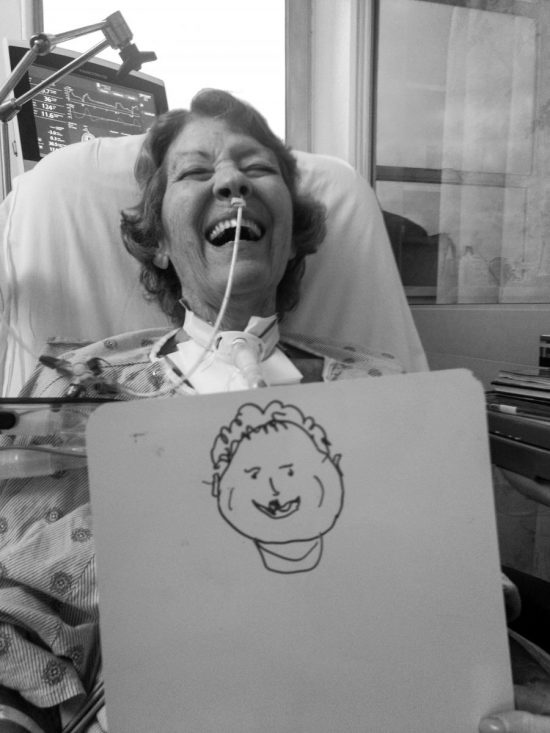Prednisone and Self-image: Transplant Side Effects We Don’t Talk About

The University of California, San Francisco (UCSF), where my mom, Holly, received her double-lung transplant, has gone to great lengths to provide information at every turn on the transplant journey. The infamous blue binder contains everything you need to know about post-transplant life.
UCSF’s approach to transplant is both collaborative and comprehensive. But their materials don’t cover every aspect of the transplant journey. The important stuff is all there. Issues that most transplant patients should anticipate and be prepared for are discussed both in person and in writing.
There are some side effects of transplantation that seem to affect everyone, yet never make headlines in the literature. Physical changes occur due to surgery and immunosuppressant medications. They are not necessarily related to, or indicative of, poor health, so they don’t hold rank in the post-transplant constitution.
However, if you ask any transplant patient, you will likely hear that they have struggled with changes to their appearance. Chronic prednisone use can cause hair, weight, and skin problems. These issues, while superficial, can have an effect on the patient’s self-image and confidence.
Much like chemotherapy, strong doses of immunosuppressants during and after surgery kill the rapidly dividing cells in our bodies. These medications affect hair and skin cells. This is why chemo patients often lose their hair. Transplant patients also often experience hair loss within the first year after transplant. But don’t fear, it does come back!
Hair can also grow with a different texture. My mom’s hair — typically very thick and wavy — became fine and straight after her transplant. She was used to having a lot of hair to work with and struggled to style her wispy do. Products that should add structure to her waves weighed down her fragile locks. Nothing seemed to improve her hair texture.
Her advice is to ask your stylist for product recommendations and styling tips. A professional can help you feel confident with your style while you wait for your hair to grow back to its former glory.
Another fun hair issue that may affect someone on prednisone is new or different body hair growth. Body hair may come in thicker in places you aren’t used to. Existing body hair may grow darker than before. Some folks might find this frustrating, but it’s not necessarily a bad thing! We live in an age where epic, bushy eyebrows are “in.”
I’m not saying that societal standards are a good reason to do something you don’t want to do with your appearance. As someone who chronically over-plucked my eyebrows to appease bullies as a teen, I know that pressure. It sucks. Both because and in spite of that experience, I would love to see us embrace the bushy brow.
Plus, if you leave your body hair alone, you won’t risk hurting your skin with hair removal methods! One of the least fun side effects of my mom’s prednisone use has been extremely fragile skin. Paired with a blood thinner, her skin has taken a beating since her transplant — or at least, it sometimes looks that way. The slightest bump against a corner can cause dark bruising that is slow to heal. What would be a scratch to a person with healthy skin can become a large gash on my mom’s delicate skin.
The good news is that my mom does have a skin care product recommendation. DerMend Moisturizing Bruise Formula has helped her skin to heal faster and be more resilient. It is available over the counter, and while it is a bit pricey, my mom says it is worth the cost. We have no affiliation with this brand, so know that this recommendation exists because this lotion actually works.
The final side effect that often causes insecurity in prednisone users is “moon face.” Anyone who’s taken prednisone for an extended period has likely been a victim of moon face. The drug changes our body’s fat distribution. It causes fat to deposit in the cheeks and neck, giving the face a rounded appearance.
Sadly, there’s nothing to do to change moon face, other than stop taking prednisone. My mom did note that for older patients, the bright side is that wrinkles get “filled in.” Although it can be disheartening, it is a reminder that you are healthy enough to gain weight and be alive with donated lungs. For better or worse, prednisone is a key ingredient to keeping those lungs working in harmony with your body.
I know that acknowledging your relative health is not a counterbalance to insecurity. There are lots of ways to build confidence in your appearance after transplant. Feeling better about your self-image could be as simple as treating yourself to a haircut or a facial, or even giving yourself a full spa-day at home. Make self-care a priority!
***
Note: Pulmonary Fibrosis News is strictly a news and information website about the disease. It does not provide medical advice, diagnosis, or treatment. This content is not intended to be a substitute for professional medical advice, diagnosis, or treatment. Always seek the advice of your physician or other qualified health provider with any questions you may have regarding a medical condition. Never disregard professional medical advice or delay in seeking it because of something you have read on this website. The opinions expressed in this column are not those of Pulmonary Fibrosis News or its parent company, Bionews, and are intended to spark discussion about issues pertaining to pulmonary fibrosis.









Julie
Thank you for providing the article on rather effects of prednisone. It was bang on. It describe all of my physical and emotional well-being I've been feeling so self-conscious about my appearance and your article provided me a kind of peace knowing I wasn't alone.
Christie Patient
Thank you for sharing Julie. You are certainly not alone! It can be hard to grapple with physical changes when we are expected to just be grateful to be alive in the first place... if you are interested, my friend Kathleen Sheffer (a heart/double-lung transplant recipient) made this video talking about using photography to improve her self-image after her transplant. Her video is what inspired me to write about this subject. She is very honest about her experiences struggling with self-confidence and learning to love her new body, post-transplant. Check it out at the link below!
https://player.vimeo.com/video/446078331?fbclid=IwAR197doQUpEGyCWdylF-n-iDIztg1_JFapFGQAEQCItskwHGEdlUOozX0vg
Lois Benvenuto
Christi... Interesting article. My late husband was one of the first liver transplants at UCSF. Yes, he experienced many of the same side effects of the life sustaining drugs. At one point he was no longer allowed to participate in the support group. UCSF did not want him talking about drug side effects to pre transplant patients ???
I could go on and on but will leave it there.
As my husband would say... Life is not always greener on the other side.
Paula Tog
My husband had a liver transplant a year ago and has had quite a few complications but we have had no support on what this does to your family. The post transplant clinic just deals with the blood results and the medication changes. The support group on Facebook posts very infrequently. Any suggestions as to a support group ?
Christie Patient
Hi Paula, I am sorry to hear that your family has felt unsupported through the transplant journey. I reached out within my rare disease network and someone suggested facebook groups. I see that you are in one, but it might be worth broadening your search to find one that is more active. Since we can't safely meet in person right now, I bet there are some groups out there with people from all over who are connecting online. I messaged a liver transplant patient who writes for IBD News, but haven't heard back yet. I will update you when I do :)
For more local/in person groups, have you tried asking a social worker at your husband's transplant hospital? They usually have the scoop on things like that.
Barry McGee
Hi Paula
Very sorry to hear about your husband and your lack of available support.
Try " Inspire.com" That site has numerous support groups covering many illnesses and conditions. There are many "communities " covering liver transplant associated subjects.
You can message me and let me know if you find what you need.
Good Luck
Barry McGee
Christie Patient
Hi Again Paula,
My colleague recommends this group on Facebook, and also suggests looking for disease specific support groups to find more common ground with people. Hope that helps :)
https://www.facebook.com/groups/2225037811
Christie Patient
Lois, thanks for sharing your family's experience. I'm sorry to hear that your husband struggled so much with the side effects. I wish there was a way to predict how people would respond. As for support groups, it can be hard to know what to think as a pre-transplant patient or family member when you hear about one person's success and someone else's struggles. I hope he was able to find a network of folks who could hear him out and support him through his trials.
RD
Christie, Your piece was spot on. I too needed to hear I was not alone.
I had a single lung transplant end of May 2020 and in spite of the excellent care I have received, was not aware of many of these side effects. Within four weeks of the procedure, I had to be rushed back to the ER for a four day stay, due to excruciating, searing, burning, nerve pain. Apparently, this happens frequently and can happen even a year later.
Apart from side effects similar to what your mother is experiencing, I have bad tremors and last week was told that my breathless and raspy voice is because my vocal chord got paralyzed during surgery, which sometimes happens. So have to undergo more procedures in hopes it will get resolved.
I am truly grateful for this second chance but all these unforeseen challenges are overwhelming sometimes.
Christie Patient
Hi RD,
Thanks for sharing your experience. I appreciate how vulnerable folks are willing to be on this post! I'm sorry that you had some nasty side effects. I don't think my mom has had nerve pain, but she has had bad insomnia. Several of my transplanted friend also struggle with mild tremors (shaky hands) as a result of the prednisone.
As for the paralyzed vocal chords, I believe that is a result of being intubated rather than an adverse reaction to a drug. Unpleasant and frustrating, I'm sure, but I just wanted to clarify for other readers. To my knowledge, that issue usually resolves within several months.
I wish you the best with your recovery, and no more nasty surprises! Congrats on your new lung, and thanks again for sharing your story.
Christie
Lydia
I’ve read this article many times pre-transplant, and now,16 months post transplantation I’m wondering what my hair will decide to do. The fine strands are uninspiring, to say the least, but a small trade off for the new life I now live. Thanks for your information and gentle humor.
Christie Patient
Thanks for reading and leaving a comment Lydia :) I am glad this column has been helpful to you. My mom's hair had a similar journey, but did eventually go back to her pre-transplant glory. I hope the same happens for you, but if not? Like you said, a small trade for a new life.